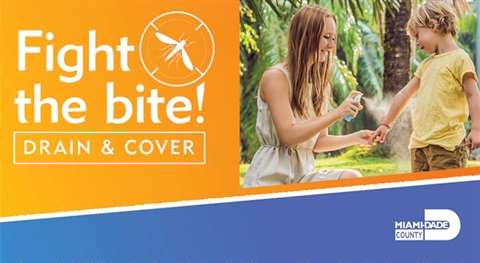It’s Mosquito Season in South Florida - Here’s What You Can Do
Published on July 01, 2025

The summer heat is here, and with it comes one of South Florida’s least welcome guests: mosquitoes. While Miami-Dade County’s Mosquito Control Division is out treating neighborhoods, inspecting properties, and tracking populations, residents are urged to take simple steps at home to stay bite-free.
"Keeping our residents safe and healthy is our number one priority, and that includes protecting them from the serious risks mosquitoes can pose during the summer," said Miami-Dade County Mayor Daniella Levine Cava. "Our Mosquito Control team is working around the clock, but we all have a role to play. With a few simple actions, every household can help prevent the spread of mosquito-borne illness. This is about neighbors helping neighbors, and every drop of standing water we get rid of is a win for public health."
So where do you start? Think small. A forgotten toy, an old planter, or even a clogged rain gutter can become a breeding site in just days. Take a walk around your yard after it rains. Dump any standing water, refresh birdbaths weekly, and toss out anything that collects water and isn’t being used.
Miami-Dade’s Mosquito Control Division recommends:
- Apply a U.S. Environmental Protection Agency-registered mosquito repellent with DEET, picaridin, oil of lemon eucalyptus, or IR-3535.
- Apply sunscreen first, then mosquito repellent—not the other way around.
- Use larvicide (Bti) in bromeliads, fountains, and decorative ponds.
- Replace outdoor pet water and birdbath water weekly.
- Keep gutters clean and free of debris.
- Properly dispose of unused containers that collect water.
- Repair or install fine mesh screens on windows, doors, and patios.
- Store car/boat tarps properly to avoid water collection.
- Fill tree and lawn holes with soil or sand.

To request a free mosquito inspection, call 311, visit miamidade.gov/311direct, or download the MDC Solid Waste app.
The County’s mosquito control strategy also includes enhanced surveillance using over 300 mosquito traps, weekly data analysis, and truck spray programs. A new A1 Super Duty larviciding truck has been added to boost efforts. The County also works closely with the Florida Department of Health to respond quickly when mosquito-borne illness is suspected or confirmed.
Stay informed all summer long—follow @305Mosquito on Instagram, Facebook, and X for live updates on spraying schedules, prevention tips, and behind-the-scenes looks at how the County is fighting mosquitoes in your neighborhood.
Every small action counts—so let’s work together to stop mosquitoes before they start.